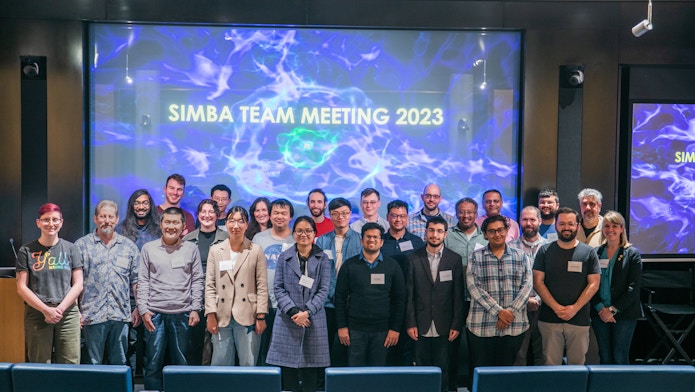SIMBA Collaboration Meeting

The Simba simulation suite and associated projects such as CAMELS and the 300 Cluster Comparison project have provided novel and state-of-the-art additions to the pantheon of current galaxy formation models. Since its release in 2019, it has been used for a wide range of studies from massive galaxies today to early galaxies seen with JWST, from exploring cold gas in HI and H2 seen at long wavelengths to hot gas in massive halos seen in the X-ray, and from large-scale cosmology to the interstellar medium.
This Simba Team workshop aims to bring together the wide range of astrophysicists working with Simba and affiliated simulations, for both observational and theoretical projects. The goal is to share results and ongoing work with the Simba simulations, coordinate existing projects, and make plans and spur collaborations for future work. We would like to promote the exchange of ideas, tools, and knowledge between subgroups working on different aspects of galaxy formation and cosmology.
If you are interested, please register for the workshop. There is no workshop registration fee and breakfast/lunch/coffee breaks are generously provided by the Flatiron Institute. Other travel costs are to be borne by the participants. The workshop will begin the morning of Monday May 1, 2023 and end at lunchtime on Thursday May 4. Workshop participants are welcome to stay the rest of the week to explore more collaborations with other attendees and/or CCA folks.
COVID Policy: By making entry to our buildings all staff, vendors and guests will implicitly attest to being symptom/COVID free. Vaccination status will no longer be validated as a condition of entry. However, all staff and affiliates are strongly encouraged to remain up to date with their vaccination boosters, according to their individual eligibility.
MONDAY
Morning Chair: Doug Rennehan
9:00-10:00 Breakfast
10:00-10:20 Welcome & Simba status report — Romeel Davé
10:20-10:45 Zoomed-in simulations with SIMBA — Weiguang Cui
10:45-11:30 Coffee break
11:30-11:55 The interplay of dual black hole accretion and feedback modes in SIMBA – Daniel Anglés-Alcázar
11:55-12:20 Exploring the link between feedback and galaxy SF history – Kartheik Iyer
12:20-12:55 The impact of feedback on haloes and large-scale structure – Daniele Sorini
12:55-2:00 LUNCH
Afternoon Chair: Daniel Anglés-Alcázar
2:00-2:25 Simulating Galaxy Groups and their Massive Central Galaxies – Arif Babul
2:25-2:50 Group X-ray scaling relations and mass bias in SIMBA – Fred Jennings
2:50-3:15 ISM evolution in the SIMBA cosmological simulation: galaxies in cluster environment – Guiliano Lorenzon (remote)
3:15-3:45 Coffee break
3:45-4:10 Characterizing AGN Feedback Processes at z~1 with SIMBA – Skylar Grayson
4:10-4:35 Probing the impact of AGN feedback on gas distribution with SIMBA and IllustrisTNG – Tianyi Yang
4:35-5:00 AGN feedback effects on the low redshift Lyman-alpha forest – Megan Tillman
5:30-7:00 Reception @ CCA
TUESDAY
Morning Chair: Desika Narayanan
8:30-9:30 Breakfast
9:30-9:55 CAMELS – Paco Villaescusa-Navarro
9:55-10:20 Modelling the Cosmology and Astrophysics Dependent Galaxy-Halo Relationship using Normalizing Flows and the CAMEL Simulations – Chris Lovell (remote)
10:20-10:45 Using CNN to Predict Galaxy Properties – Jinoo Kim
10:45-11:30 Coffee break
11:30-11:55 Cosmic Sands: The Origin of High-z Dusty Galaxies – Sidney Lower
11:55-12:20 The rapid evolution of galaxies’ ISM in the metric of cosmic web – Darko Donevski
12:20-12:55 Improved Dust and H2 Modelling in SIMBA – Ewan Jones (remote)
12:55-2:00 LUNCH
Afternoon Chair: Neal Katz
2:00-2:25 The physics of interstellar dust at high and low redshift – Desika Narayanan
2:25-2:50 Charting the redshift evolution of metallicity indicators using SIMBA – Prerak Garg
2:50-3:15 SIMBA predicts exotic H2 gas-to-dust ratios in quiescent galaxies – Kate Whitaker
3:15-3:45 Coffee break
3:45-4:10 Cosmic Evolution of Atomic and Molecular Gas within Dark Matter Halos – Wenlin Ma/Kexin Liu
4:10-4:35 The History of Dust-obscured Star Formation – Dhruv Zimmerman
4:35-5:30 Analysis tools presentations and group discussion: CAESAR (Romeel/Desika), Powderday (Desika), swiftsimio (Josh), MOXHA (Fred), PyMSZ (Weiguang), Daniele (profiles, pygad), SIMBA/Rockstar (Kevin)
WEDNESDAY
Morning Chair: Arif Babul
8:30-9:30 Breakfast
9:30-9:55 The Physically Evolved Wind Model – Neal Katz
9:55-10:20 Absorption lines of wind particles in simulations – Lisiyuan Yang
10:20-10:45 Revealing the subtle differences in the stellar-to-halo mass relationship between different models through subhalo tracking – Austen Gabrielpillai
10:45-11:30 Coffee break
11:30-11:55 Radio galaxies in Simba and comparisons to MIGHTEE – Nicole Thomas (remote)
11:55-12:20 Physical properties of JWST galaxies via machine learning – Qingyang Li (remote)
12:20-12:55 The evolution of early quenched galaxies in Simba – Jakub Szpila (remote)
12:55-2:00 LUNCH
Afternoon Chair: rachel somerville
2:00-2:25 Introduction to Simba-C: an updated chemical enrichment model – Renier Hough
2:25-2:50 Kiara – Romeel Davé
2:50-3:15 Zoom Simulations with SWIFT – Will Roper
3:15-3:45 Coffee break
3:45-5:00 Ongoing and future projects discussion – Romeel Davé et al.
THURSDAY
8:30-9:30 Breakfast
Ad hoc breakout sessions.
10:45-11:15 Coffee break
Ad hoc breakout sessions.
12:30-1:30 LUNCH